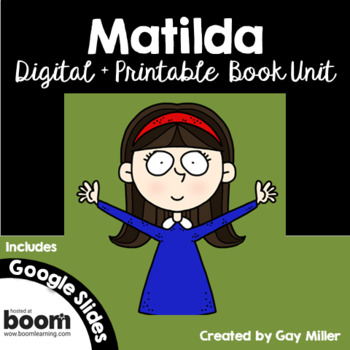Matilda Novel Study: Digital + Printable [Roald Dahl]
- PDF
- Google Apps™
- Internet Activities

What educators are saying
Also included in
- Roald Dahl is one of the most loved children’s authors. Save by purchasing six book units based on Dahl’s work in this one bundle. Books in this series include:+ Charlie and the Chocolate Factory + Fantastic Mr. Fox + The BFG + James and the Giant Peach + The Witches + Matilda Because each of thesePrice $40.00Original Price $56.50Save $16.50
Description
Are you looking for an all-in-one unit for Matilda by Roald Dahl? Look no further. This comprehensive digital + printable unit includes vocabulary practice, comprehension quizzes/chapter questions, constructed response writing prompts, skill practice, and language arts lessons. Lessons are aligned to the Common Core Standards for grades 4-5.
Check out both versions of Matilda Book Units to determine which fits your teaching style best. This is Version #1.
Version #1: Matilda Digital + Printable Book Unit (This product contains the entire printable version + Boom Learning Decks + Google Digital Slides.)
Version #2: Matilda Printable Book Unit (This product contains the entire printable version.)
✨ DIGITAL RESOURCES
This novel study includes links to digital resources. Boom Learning is used for multiple-choice, short-answer, and fill-in-the-blank questions such as comprehension and vocabulary practice.
Activities that require more open-ended responses may be found in Google Slides. This includes all the writing prompts with organizers for students to plan responses.
✏️PRINTABLE RESOURCES
Lesson Plans at a Glance
Vocabulary (21 focus words, 1 word for each chapter)
- Word List including definitions, synonyms, and sample sentences from the text
- Bookmarks
- Word Cards
- Practice Booklet (12-page booklet)
- Test
Comprehension and Writing
- 11 Comprehension Checks consisting of Multiple Choice, Fill-in-the-Blanks, and Short-Answers
- 24 Constructed Response Writing Questions
Skill Practice
- Homophone: Graffiti Notes and Practice
- Prefixes and Suffixes: Word Lists, Organizers, Puzzles, and Game
- Figurative Language Response Cards and Organizers
Problem and Solution Essay
- Structure of a Problem and Solution Essay Organizer
- Creating an Outline
- Writing the Introductory Paragraph
- Turning the Organizer into a Paper
- Proofreading and Editing
- Writing Individual Essays
°*”˜˜”*°•.¸☆*”˜˜”*°•.¸☆ ★ ☆¸.•°*”˜˜”*°•.¸☆*”˜˜”*°
If you want additional book units, click here for the full list of ★available titles.






